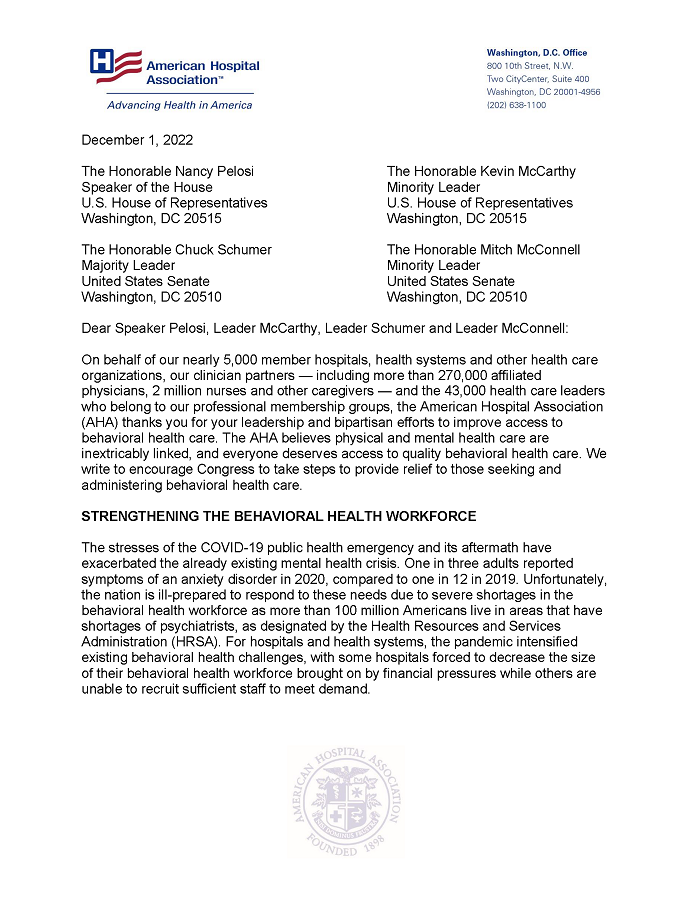

AHA Letter to Congress on Year-End Behavioral Health Priorities
December 1, 2022
Speaker of the House
U.S. House of Representatives
Washington, DC 20515
The Honorable Chuck Schumer
Majority Leader
United States Senate
Washington, DC 20510
The Honorable Kevin McCarthy
Minority Leader
U.S. House of Representatives
Washington, DC 20515
The Honorable Mitch McConnell
Minority Leader
United States Senate
Washington, DC 20510
Dear Speaker Pelosi, Leader McCarthy, Leader Schumer and Leader McConnell:
On behalf of our nearly 5,000 member hospitals, health systems and other health care organizations, our clinician partners — including more than 270,000 affiliated physicians, 2 million nurses and other caregivers — and the 43,000 health care leaders who belong to our professional membership groups, the American Hospital Association (AHA) thanks you for your leadership and bipartisan efforts to improve access to behavioral health care. The AHA believes physical and mental health care are inextricably linked, and everyone deserves access to quality behavioral health care. We write to encourage Congress to take steps to provide relief to those seeking and administering behavioral health care.
Strengthening the Behavioral Health Workforce
The stresses of the COVID-19 public health emergency and its aftermath have exacerbated the already existing mental health crisis. One in three adults reported symptoms of an anxiety disorder in 2020, compared to one in 12 in 2019. Unfortunately, the nation is ill-prepared to respond to these needs due to severe shortages in the behavioral health workforce as more than 100 million Americans live in areas that have shortages of psychiatrists, as designated by the Health Resources and Services Administration (HRSA). For hospitals and health systems, the pandemic intensified existing behavioral health challenges, with some hospitals forced to decrease the size of their behavioral health workforce brought on by financial pressures while others are unable to recruit sufficient staff to meet demand.
While we are committed to working with the health care field and with Congress and the Administration to address the long-term workforce needs, we have identified several improvements that could be made now to provide much needed short-term relief.
- Invest in graduate medical education (GME) and increase slots for behavioral health in underserved areas. There is an urgent need for additional physicians in the U.S. The purpose of GME funding is to ensure an adequate supply of well-trained physicians. (S.1438 Opioid Workforce Act of 2021; H.R.3441 Substance Use Disorder Workforce Act; and Senate Finance Committee discussion draft Enhancing the Mental Health Workforce)
- Streamline and simplify licensure application and processing by reducing variability of scope of practice laws and support changes that drive integration of care teams. This would allow patients in underserved areas to seek care from clinicians in different states and expedites the process to onboard new staff.
- Remove regulatory barriers for certain types of licensed practitioners to provide remote services (e.g., licensed addiction counselors, family therapists) to expand access to needed care. (H.R.432 Mental Health Access Improvement Act of 2021)
Reducing Regulatory Burdens
Psychiatric facilities confront the daunting task of complying with a growing number of federal regulations. This means clinical staff must devote more and more time to regulatory compliance, detracting from patient care. In addition, these facilities are required to take extra steps to mitigate risks of patient self-harm. Unfortunately, federal guidelines on these steps have been unclear and contradictory to clinical care, resulting in millions of dollars in expenses to retrofit facilities to comply with varying interpretations of CMS guidelines on ligature risk abatement.
Another regulatory concern relates to a psychiatric facility’s responsibilities under the Emergency Medical Treatment and Labor Act (EMTALA). The intent of the law is to ensure that any patient who presents to an emergency department (ED) would be stabilized regardless of the patient’s ability to pay. However, regulators have begun interpreting the law in a way that imposes additional requirements on psychiatric facilities. These requirements are not consistent with the intent of EMTALA, run counter to accepted clinical practice and impose enormous costs on these facilities which already suffer from inadequate payment.
Congress should help reduce the administrative burden on providers in the following ways:
- Direct CMS to review and revise conditions of participation for psychiatric facilities to reduce unnecessary regulatory burdens, such as B-tag requirements and environmental risk mitigation.
- Clarify requirements under EMTALA for inpatient psychiatric facilities with EDs.
Revising Federal Payment Policies for Behavioral Health
Lastly, we urge Congress to examine the inadequate federal payment policies for these vital behavioral health care services. These arbitrary and outdated payment policies continue to reflect the undervaluing of behavioral health services, which may require more evaluation and time than certain medical services. Congress should consider the following.
- Eliminate the Institutions for Mental Disease (IMD) exclusion. This exclusion prohibits the use of federal Medicaid financing for care provided in mental health and substance use disorder residential treatment facilities larger than 16 beds to patients ages 21 to 64.
- Remove the 190-day lifetime limit for inpatient psychiatric hospital care for Medicare beneficiaries (S.3061 Medicare Mental Health Inpatient Equity Act). No other Medicare specialty inpatient hospital service has this type of arbitrary cap on benefits. Not only does this restriction limit access to care for many patients with chronic mental illness who will exceed 190 days of inpatient treatment, but also it contributes to the stigma and discrimination against patients with mental illness.
- Increase reimbursement rates for behavioral health services in rural and underserved areas. Fee-for-service payment structures rarely reimburse for important elements of behavioral health care, such as coordinating care across providers and settings, or for non-face-to-face care management. These low reimbursement rates make it incredibly challenging for rural and underserved communities to continue to provide these critical services.
We appreciate your leadership and look forward to working together to address these important issues.
Sincerely,
/s/
Lisa Kidder Hrobsky
Senior Vice President of Advocacy & Political Affairs


